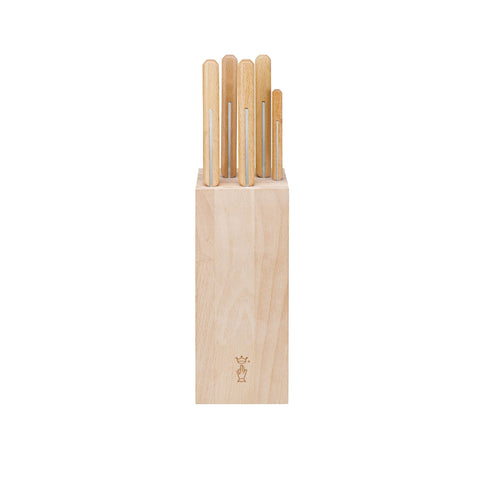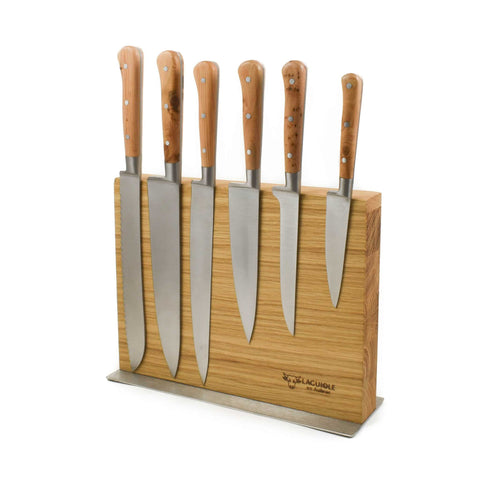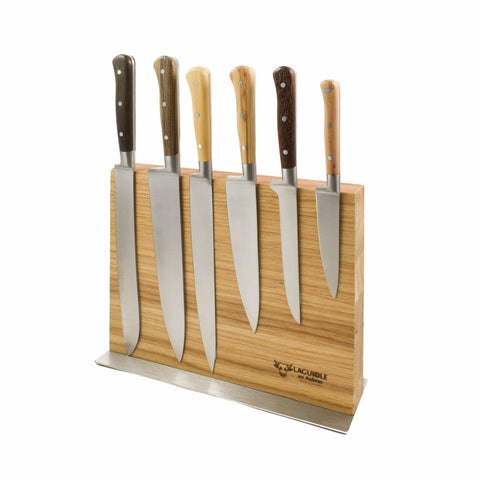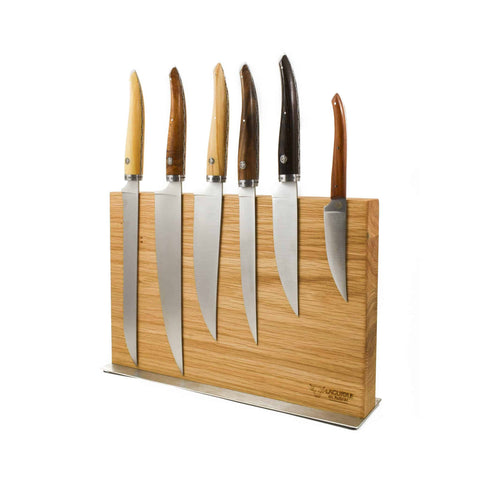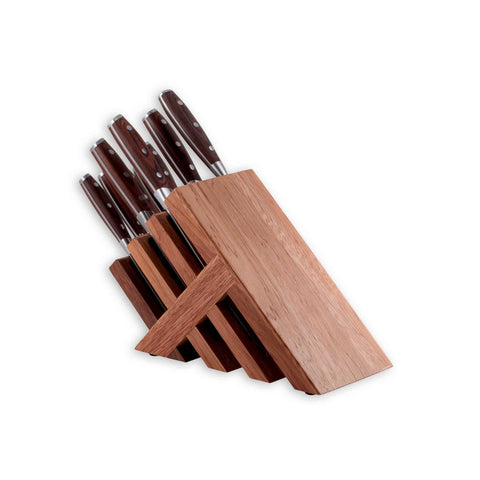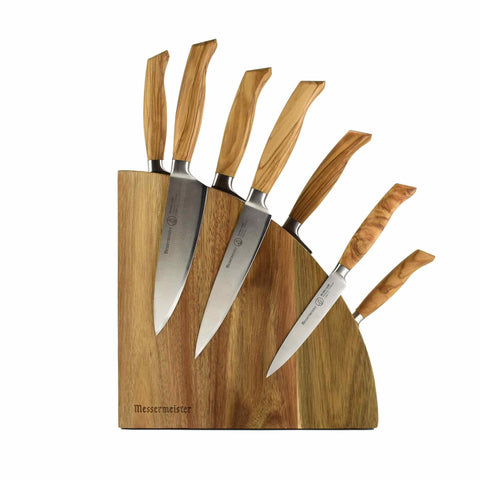Best Knife Blocks And Kitchen Knife Sets
by Kristin Lohse

You may wonder which kitchen knives should you put in a block or which knife block should you get? Is it even worth it?
Well, to start, selecting the best knife block involves more than just aesthetics; it's about efficiency and matching your kitchen needs.
Whether you're an avid cook or enjoy hosting, there's a knife set to enhance your cooking and dining experience.
Remember, the best knives feel right in your hand and meet your everyday needs without clutter.
In this article:
- Should I buy a kitchen knife block?
- What are the different types of knife block?
- Buy the best knife block
- How to clean a kitchen knife block
Looking for more knife expertise? Read our What Are The Best Kitchen Knives blog, or browse all our Kitchen knives or shop knife block storage here.
Should I buy a kitchen knife block?
Yes, if you value organisation and care for your knives. A knife block keeps blades sharp and ready. It's a practical choice for any kitchen.
Here are six reasons why everyone should have a knife block in their kitchen:
-
Protects knives. A block safeguards the blades. It prevents them from banging against other utensils, keeping them sharper for longer.
-
Saves space. By holding multiple knives, a block conserves precious drawer space. It keeps your countertop neat and your knives within reach.
-
Hygienic reasons. Storing knives in a block reduces the risk of cross-contamination compared to a drawer where knives may mix with other utensils.
-
Variety of sizes. Blocks come in many sizes, offering slots for different knives. This variety ensures you have the right tool for every task, from slicing bread to chopping vegetables.
-
Aesthetic appeal. Knife blocks can be stylish additions to your kitchen. They come in various materials and designs, from classic wood to modern stainless steel.
-
Safety reasons. A block reduces the risk of accidents. Retrieving a knife from a block is safer than rummaging through a drawer.
What are the different types of knife block?
Sous Chef knife buyer Kristin shares what she looks for in a knife block - and explains the different types to choose from.
She says: At Sous Chef we have a few different types of knife block: magnetic, classic and decorative… Here are the different types of knife block I think are best.
-
Magnetic knife blocks hold your blades against the wood where you can still see them. These are absolutely stunning to look at. But also a great choice for convenience and hygiene. It's easy to see which knife you'd like in an instant. Plus there's no risk of crumbs gathering in deep knife holes.
-
We have some extraordinary decorative knife blocks. Including the totally spherical walnut knife block from Breka. This elegant wooden knife block has 12 storage slots and really makes an impact in the kitchen!
Best knife set UK
Choose the right knife block for you, with our summary of what makes each one so special:
- Opinel Parallele 5 Piece Knife Block Set - It's a great entry level knife block that includes all the knives you need, and will also help you find your favourite type of knives to potentially expand your collection if you are unsure of where to start.
- Laguiole en Aubrac Classic, Juniper - This set is a beautiful piece of craftsmanship. Juniper handles add a rustic charm. Each knife is a piece of art - bulit from start to finish by a single artisan knife maker. Perfect for those who appreciate beauty and function.
- Laguiole en Aubrac Classic, Mixed Woods - Wow - what a beautiful knife block. This set of knives will cover almost all everyday preparation in your kitchen, while looking stunning on display. Featuring juniper, olivewood, walnut and other wooden polished handles, these knives are timeless. You’ll be using them for years to come.
- Laguiole en Aubrac Gourmet, Mixed Woods - These knives are not just tools; they’re treasures. Mixed woods mean each piece stands out. And the handle shape is tapered, to sit comfortably in smaller hands. Or you may prefer the shape for the way you hold knives.
- Messermeister Avanta 10 Piece Block Set - Comprehensive and sleek. The Messermeister Avanta knife range design was inspired by one of the leading culinary schools in America, to create a knife range that was not only of the highest quality and performance, but that could withstand all the demands of a bustling cookery school.
- Messermeister 8 Piece Block Set - Streamlined and essential. Messermeister’s Oliva knives are made of 1/4116 stainless steel, which has a high carbon content meaning they are incredibly hard wearing and resistant to corrosion. Made in Solingen, Germany – which is world-renowned for quality stainless steel – these knives rank a high 57-58 on the Rockwell scale.
Which knives should you have in a block set?
Selecting the right knives for your block set can transform how you cook. Let's explore the essential types for any kitchen.
Chef's Knife Your go-to tool for most tasks. It chops, dices, and slices with ease. Think of it as your kitchen's best friend. Its versatility makes it a must-have.
Paring Knife Small but mighty. Perfect for peeling fruits or trimming vegetables. Its precision is unmatched for detailed work.
Bread Knife. With its serrated edge, it glides through crusty loaves. No squishing, just perfect slices. It's also great for soft fruits like tomatoes.
Utility Knife. The middle child between a chef's and paring knife. Ideal for tasks that are too big for a paring knife but too small for a chef's.
Santoku Knife. Originating from Japan, it's designed for precision cutting. Great for slicing, dicing, and mincing, especially for fish and vegetables.
Boning Knife. It's a sturdy blade that debones meat cleanly. A game-changer for making your own fillets or preparing meat.
Fillet Knife. This knife has a flexible blade. It's perfect for fish, removing skin and bones with finesse.
Cleaver. For those tougher tasks. It chops through bone and hard vegetables like a champ. Not for everyday use, but invaluable when needed.
Steak Knives. Often overlooked but crucial. They make dining more enjoyable, cutting through meat effortlessly.
Kitchen Shears. Not a knife, but deserving of a spot. They snip herbs, open packages, and even cut through bone.
How to clean a kitchen knife block

Keeping your knife block clean is as crucial as maintaining your knives. Here's a straightforward guide to ensure your block is as spotless as your cutlery.
Empty the block. Start by removing all knives and accessories. This exposes the slots, ready for cleaning.
Shake out crumbs. Turn the block over and shake gently. Crumbs and debris will fall out. For stubborn bits, use a hairdryer on a cool setting to blow them out.
Vacuum the slots. Use a vacuum with a hose attachment. It's effective in removing remaining crumbs from deep within the slots.
Clean with a mild soap solution. Mix a little dish soap with warm water. Dip a small brush (a bottle brush works well) in the solution. Scrub each slot individually to remove grease and residue.
Disinfect. After soap cleaning, it's time to disinfect. Mix equal parts water and white vinegar. Dampen a cloth with the mixture and wipe the exterior. For the slots, use a slim, dampened brush.
Air dry completely. Moisture is the enemy. Ensure the block dries thoroughly before replacing knives. Air drying is best, preferably overnight.
Consider monthly maintenance. Repeat this process monthly. It keeps the block in top condition, preventing mould and bacteria buildup.
Oil wooden blocks. If your block is wooden, treat it with a food-grade mineral oil after cleaning. This maintains the wood's integrity and prevents cracking.
Store knives dry. Always dry knives before returning them to the block. This minimises moisture introduction, keeping the block cleaner, longer.
Check for wear and tear. Regularly inspect the block for damage. Cracks or splits can harbour bacteria. Replace if necessary for safety and hygiene.
A tried and tested knife set with a good variety of kitchen knives and kitchen blades is a fantastic way to make sure you're equipped for every kitchen task.
How do you like to cook?
Make sure your knife set reflects the tasks you do most often.
Paring knife
Include a paring knife for regular delicate work
Carving knife
A carving knife if you love a weekly roast chicken, or a small serrated knife for preparing tomatoes and stone fruit often.
Bread knife
A good bread knife is something you'll use every day. They make fantastic wedding gifts too.
However you like to cook, having the right knives included in your set makes a big difference.
Knife block sets are usually wipe-clean only, and not dishwasher safe. For maintaining your new blades, consider an integrated sharpener for both scissors and knives - to sharpen your kitchen scissors at the same time. Or include a honing steel in your online basket to make sure your new knife block set stays in perfect condition.
When selecting a knife set, it's crucial to consider how you'll be using your knives most frequently. A paring knife is essential for tasks that require precision, such as peeling fruits or slicing small vegetables. For those who often prepare meat, a carving knife and utility knife are invaluable tools, making slicing through roast meats and portioning meat cuts effortless. Santoku knives are also a great addition, offering a sharp edge for precise slicing and dicing, particularly in Japanese style knives.
To maintain the sharpness of your kitchen knives, invest in a good knife sharpener. Whether you choose a manual sharpener or an integrated sharpener, keeping your blades in top condition is key to a seamless cooking experience. For those who prefer the traditional method, a honing steel is perfect for maintaining a razor-sharp edge. Sharpening your knives regularly not only extends their lifespan but also ensures you're always ready to tackle any kitchen task with ease.

About the author
Kristin is the Purchasing and Buying assistant at Sous Chef. She has several chefs and excellent home cooks in her family, and grew up in the kitchen in Sweden. Cooking and baking with her mum happened pretty much every day. Cinnamon rolls were always stocked up in the freezer, and if they were running low, more baking had to be done. Kristin always loves learning more about food and ingredients to continue improving her skills.



















